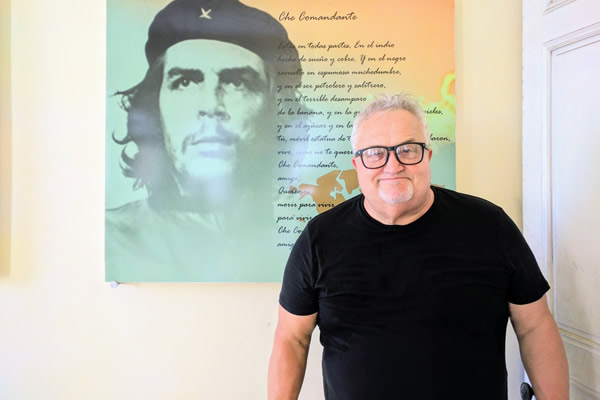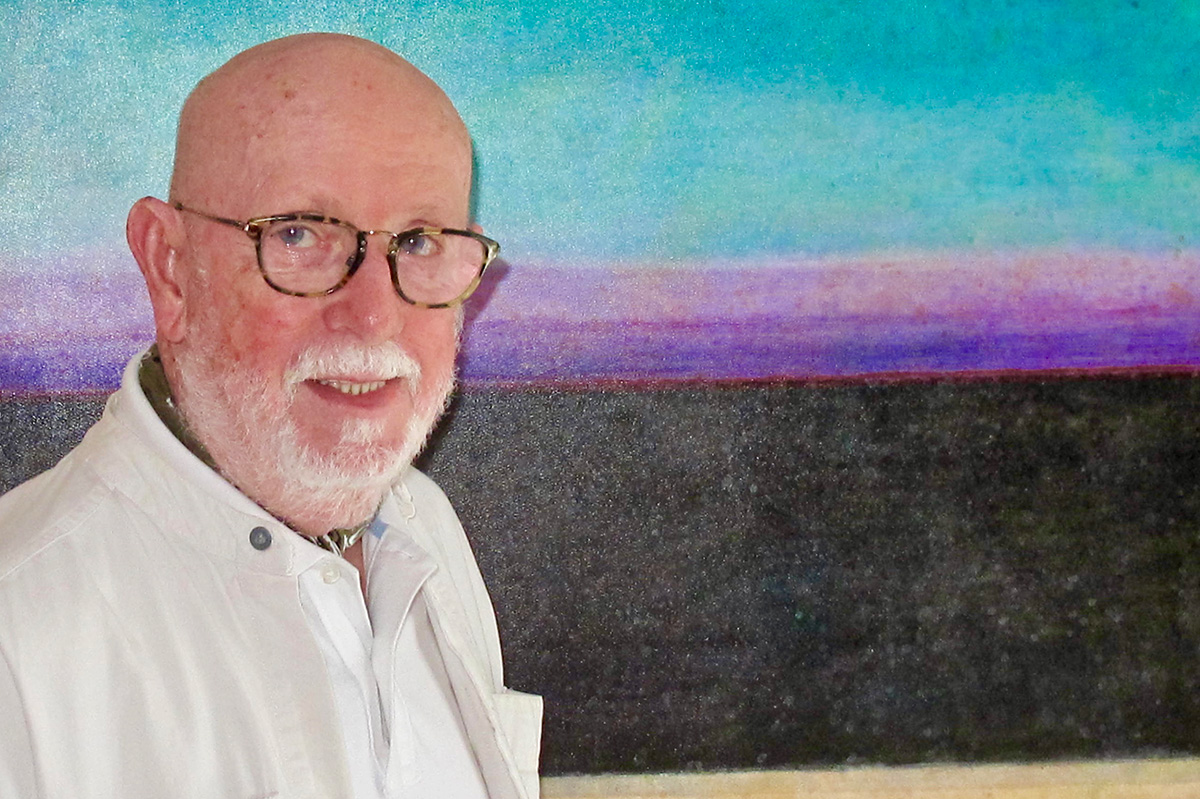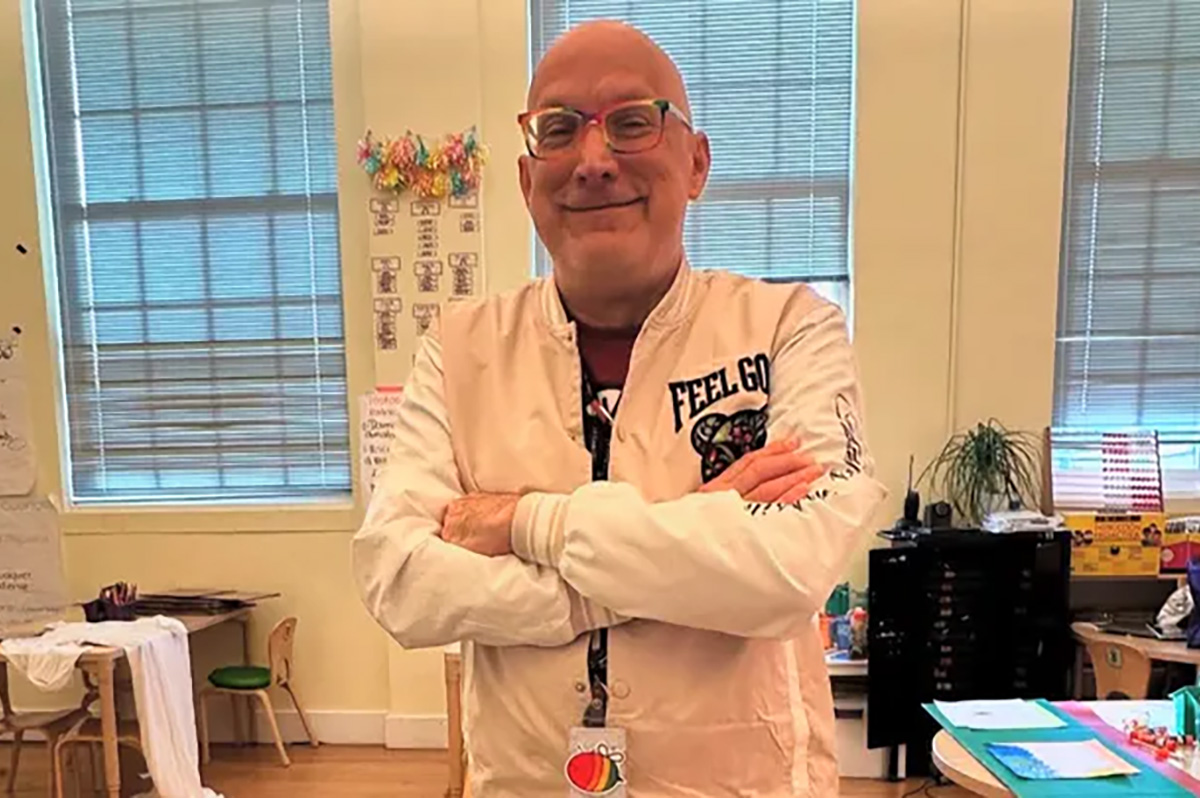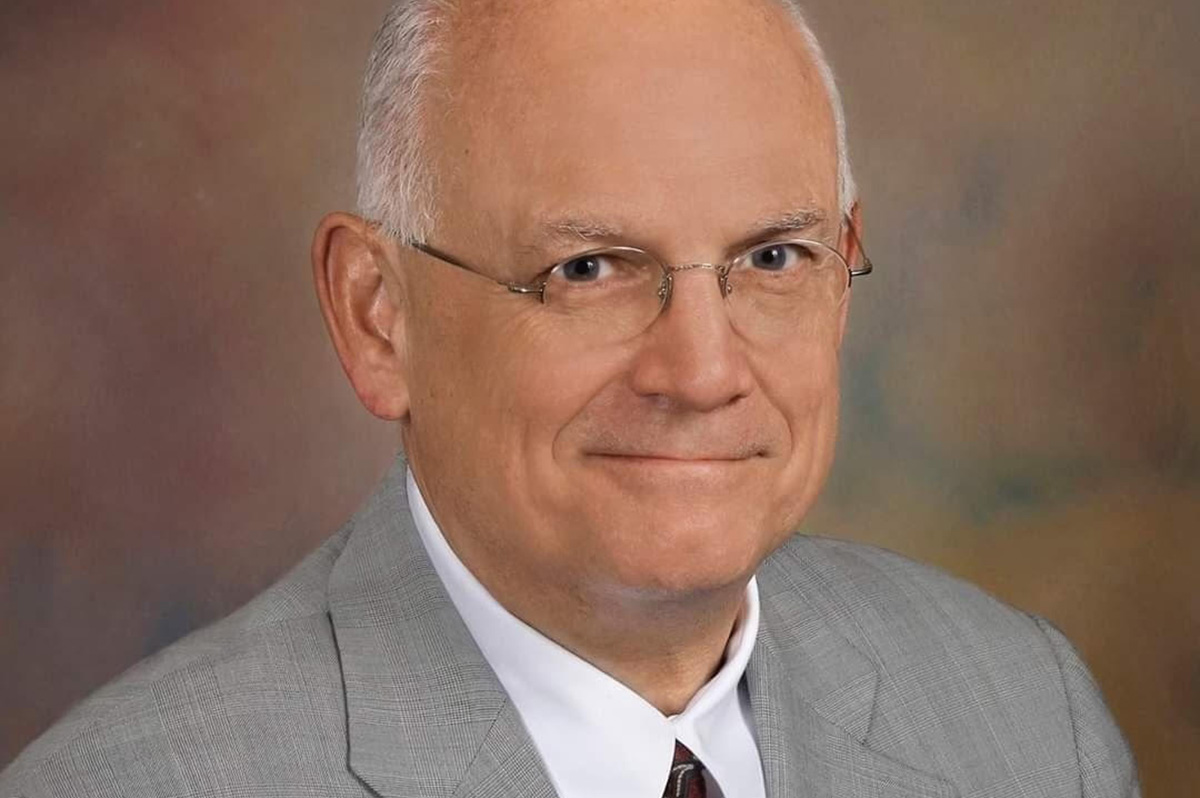Obituary
Scott Robbe dies at 66
Veteran AIDS, queer and progressive activist was born in Wis.

Veteran progressive activist and TV-film-stage producer Scott Robbe died on Sunday, Nov. 21, 2021, according to a statement by Paul Algiers, a longtime friend and the executor of Scott Robbe’s estate. Robbe was in hospice care at the home of his sister, Angela, in Hartford, Wis. He was 66.
Robbe died of complications from Myelodysplastic Anemia, a blood cancer he had battled for more than a year. He had undergone stem-cell treatment at Dana-Farber Cancer Institute in Boston in April of this year.
Robbe was a prominent member in the founding of two direct-action groups in New York City: ACT UP and Queer Nation. Robbe was a member of an ACT UP undercover team, led by activist Peter Staley, that secretly gained access to the New York Stock Exchange in September 1989. Their goal was to protest and publicize the record high price of AZT, then the sole approved treatment for HIV/AIDS. Burroughs Wellcome eventually bowed to this nationally publicized activist pressure and lowered its drug price — then the highest in medical history — by 20 percent.
“Scott was a fearless activist, always on the front lines, whether he was protesting pharmaceutical company greed or homophobia at the Oscars,” said ACT UP New York veteran Ann Northrop. “And he was a total sweetheart.”
“Scott was one of those activists who didn’t flinch when our lawyers would warn us of all the possible charges and maximum sentences we’d face for infiltrating a powerful institution,” said Peter Staley, who chronicled his ACT UP days in the new memoir, “Never Silent”. “When it came to fighting for his dying gay brothers, he’d always reply, ‘I’m in.’”
In 1991, Robbe relocated to the West Coast and co-founded Out in Film, a Los Angeles-based group to battle homophobia in Hollywood filmmaking. At the time, several high-grossing films offered stereotypic and unflattering depictions of gay characters, including Jonathan Demme’s “Silence of the Lambs”, Oliver Stone’s “JFK” and Paul Verhoeven’s “Basic Instinct”.
Out in Film demanded equity for LGBTQ people on both sides of the camera. Robbe and Lesbian Avengers member Judy Sisneros created a pioneering protest at the Oscar Awards in March 1991, during which demonstrators outside the Dorothy Chandler Pavilion called for increased queer visibility and fairness in career opportunities.
The Oscars protest was one highlight of a life devoted to progressive activism. It began in his teen years, when Robbe took part in 1960s marches for the environment, for civil rights and against the Vietnam War. Over the four decades that followed, Robbe’s career encompassed both community organizing and producing dozens of works in theatre, film and television.
Scott Douglas Robbe was born on Feb. 16, 1955, in Decorah, Iowa, to Helen, a homemaker, and James Robbe, a construction supervisor. The family relocated to Hartford, Wis., the following year. Robbe was a graduate of Hartford Union High School in Hartford, and entered the University of Wisconsin, Madison, in 1974, where he majored in theater arts. Located in the state capital, the college was known for its progressive student population, and Robbe took part in numerous protests.
After he graduated in 1978, Robbe moved to New York City, where he met his first boyfriend, a Bennington College student. They lived together in the East Village from 1978 to 1984. At the time, Robbe was helping to renovate the Orpheum Theatre on Second Avenue in the East Village. At the same time he produced at the neighboring Entermedia Theatre his first theatrical production, “False Promises” by the San Francisco Mime Troupe. At the famed La MaMa ETC, Robbe workshopped Harvey Fierstein’s “Fugue in a Nursery,” which forms the middle segment of “Torch Song Trilogy.” That production won wide acclaim both there and after it moved to the Orpheum Theater. Robbe also produced several plays off-Broadway, followed by the Harvey Fierstein play “Safe Sex” on Broadway.
Robbe joined ACT UP New York after seeing the group protest at the White House in October 1987 during the Second National March on Washington for Lesbian and Gay Rights. He joined the group’s Media Committee and took part in numerous protests. He also joined the newly-formed Queer Nation in March of 1990, helping to mount demonstrations across New York City aimed at queer visibility. Robbe was diagnosed as HIV-positive in the early 1990s.
In late 1990, Robbe relocated to Los Angeles to produce TV commercials for Japanese television. His first film job was an associate producer role for 1982’s “In the King of Prussia”, depicting the Berrigan Brothers’ pioneering anti-war efforts and starring Martin Sheen.
Robbe’s extensive television credits include the first-ever LGBTQ comedy special for Comedy Central in 1993, called “Out There,” and hosted by Lea DeLaria. Robbe was on the creative team for the groundbreaking 2003 series “Queer Eye for the Straight Guy.” He also produced shows for Lifetime, Comedy Central, VH1, Children’s Television Workshop and American Playhouse.
In 2005, Robbe was named executive director and film commissioner for Film Wisconsin, Inc. During his tenure, Robbe brought 28 TV and film projects to the state, including the 2009 film “Public Enemies” by Michael Mann, starring Johnny Depp and Channing Tatum. Most recently, Robbe worked with activists in Cuba to bring pressure on the American government to distribute the COVID-19 vaccine in the country. Robbe was also involved in grassroots activism in Puerto Vallarta, Mexico, where he had a second home.
Scott Robbe is survived by his mother, Helen, and his siblings and their spouses, Royce (Donna), John (Ken Hall), Jay (Francine), and Angela. Also surviving him are his uncle Peter Coffeen (Steve Getz), as well as several nieces, nephews and cousins.
There will be no funeral. Arrangements were handled by Milwaukee Cremation Society. A celebration of Robbe’s life will be broadcast online early in 2022. Donations in Scott’s memory may be made to Broadway Cares/Equity Fights AIDS and ACT UP New York.
Obituary
Longtime DC resident Thomas Walsh dies at 87
Pa. native’s husband was by his side when he passed away

Long-time D.C. resident Thomas Walsh died on May 16. He was 87.
Walsh was born on Sept. 17, 1937, in Scranton, Pa. His family later moved to Levittown, Pa.
Walsh met his husband, Anthony Carcaldi, at the Blue Note, a gay bar in Asbury Park, N.J., in 1964.
“I walked in the bar with friends from New York City,” recalled Carcaldi. “I looked at the piano and this person was singing … and all I noticed were his blue eyes.”
Walsh was singing “Because of You.”
“I walked up to the piano while Tom was singing and stared at him, which caused him to forget the words,” said Carcaldi. “He composed himself and started from the beginning.”
Carcaldi and Walsh became a couple in 1965, a year after they met, when they moved to Philadelphia.
“We moved in together and have been together ever since,” said Carcaldi.
Walsh was a freelance graphic designer until he accepted a job in Temple University’s audiovisual department. Walsh and Carcaldi moved to D.C. in 1980.
Walsh began a graphic design business and counted Booz Allen as among his clients. Carcaldi said one of his husband’s “main loves was painting,” and became a fine artist in 2005.
Walsh showed his art at the Nevin Kelly Gallery on U Street, the Martha Spak Studio near the Wharf, and at the Wexler Gallery in Philadelphia. Walsh also sang with the Gay Men’s Chorus of Washington.
Walsh and Carcaldi married at D.C. City Hall in 2014.
“Tom and I have been together since 1964 until his death,” said Carcaldi. “Tom died peacefully with me at his side in bed on May 16, 2025, holding Tom in my arms as he made the transition out of life.”
A celebration of life will take place in September.
Obituary
Beloved schoolteacher, D.C. resident Patrick Shaw dies at 60
Colleagues, friends say he ‘touched so many lives’ with warmth, kindness

Patrick Dewayne Shaw, a highly acclaimed elementary school teacher who taught and served as vice principal in several D.C. schools since moving to the District in 2002, died April 19 at the age of 60.
His friend Dusty Martinez said his passing was unexpected and caused by a heart related ailment.
“Patrick touched so many lives with his warmth, humor, kindness, and unmistakable spark,” Martinez said in a statement. “He was a truly special soul – funny, vibrant, sassy, and full of life, and we are heartbroken by his loss,” Martinez wrote.
Among those reflecting on Shaw’s skills as an educator were his colleagues at D.C.’s Mundo Verde Bilingual Public Charter School, where he served as a second-grade special education teacher since August 2023.
“Patrick brought warmth, joy, and deep commitment to Mundo Verde,” his colleagues said in an Instagram posting. “His daily Broadway sing-alongs, vibrant outfits, and genuine love for his students filled our community with energy and laughter,” the posting says.
Biographical information provided by Martinez and Karen Rivera Geating, a senior inclusion manager at the Mundo Verde school and Shaw’s supervisor, shows Shaw had a distinguished 38-year teaching career and multiple degrees in the field of education.
He was born and raised in Little Rock, Ark., and graduated from Little Rock’s Catholic High School for Boys.
He received two bachelor’s degrees, one in philosophy from St. Meinrad Seminary College in Indiana and one in elementary education from the University of Minnesota in St. Paul.
The biographical information shows Shaw received three master’s degrees. One is in secondary education and history from the University of Arkansas at Little Rock. His second master’s degree is in special education from The Catholic University of Washington, D.C. His third master’s degree is in school administration from Trinity College in D.C.
Shaw began his teaching career in 1987 in Little Rock, Ark., as a fourth grade General Education Teacher at Our Lady of Good Counsel School and a short time later at Little Rock’s St. Theresa Catholic School as a fourth-eighth grade teacher through December 1989.
He next moved to Minnesota where he spent part of the 1990s as a fifth and sixth grade teacher and a physical education instructor, according to biographical information. His resume shows that from January 1995 to December 1998 he was associated with the Minnesota AIDS Project in Minneapolis.
He “recruited, interviewed and staffed volunteer education and transportation programs for people living with HIV and AIDS,” his resume states.
Shaw next returned to Little Rock where he served from January 1998 to December 2004 as Theology Department Chair at the Mt. St. Mary Academy. His work included creating theology lessons for ninth-12th graders and creating a social justice program for 12th graders.
Upon moving to D.C., Shaw served as classroom teacher and vice principal at several schools, including the D.C. Public School’s Benning Elementary School; vice principal at Chavez Prep Public Charter School; vice principal at Bridges Public Charter School; Special Education Coordinator at Monument Academy Public Charter School; and Special Education Case Management and Math Intervention Specialist at D.C.’s College Preparatory Academy for Boys.
“Patrick dedicated 38 wonderful years to teaching, from 1987 to 2025, inspiring generations of students with his passion, wit, and kindness,” Martinez said in his statement.
Shaw was predeceased by his mother, Myrna G. Shaw, and is survived by his father, Thomas H. Shaw, his brother, James Shaw (Michele), his sister, Angela Mahairi (Wafai), and his cherished niece and nephews Austin, Tariq, Reed, Ramy, and Jasmine, according to information provided by Martinez.
Martinez said a funeral mass would soon be held in Little Rock, Shaw’s hometown.
“His family will be honoring one of his last wishes,” Martinez wrote, “to be returned home and remembered in a unique and meaningful way” – by having a tree planted in his honor, “a living tribute to the full and beautiful life he lived.”
Details of the location of the planted tree will be shared soon to offer a place where “friends and family can visit, reflect, and stay connected with his spirit,” Martinez states.
In D.C. a celebration of life for Shaw is scheduled to be held Saturday, May 3, from 2-5 p.m. at JR.’s bar at 1519 17th Street, N.W. Martinez points out that the tribute will be held during JR.’s weekly Saturday “Showtunes” event, in which sing-along performances of famous Broadway musicals are shown on video screens.
“JR.’s Saturday Showtunes were one of Patrick’s absolute favorite traditions, and gathering in that spirit feels like the perfect way to honor him,” Martinez said.
“Many have asked how they can help,” Martinez concludes in his statement. “In response we’ve created a GoFundMe page to support funeral expenses, help find a loving home for Patrick’s beloved dog, Birdie, and assist with other needs during this difficult time.”
Any remaining funds, according to Martinez, will be donated to a charity “that reflects Patrick’s passions and values.”
The GoFundMe page can be accessed at: gofundme.com/f/honoring-patrick-shaws-vibrant-legacy.
Obituary
Local attorney, LGBTQ rights advocate Dale Sanders dies at 75
Acclaimed lawyer credited with advancing legal rights for people with HIV/AIDS

Dale Edwin Sanders, an attorney who practiced law in D.C. and Northern Virginia for more than 40 years and is credited with playing a key role in providing legal services for people living with HIV/AIDS beginning in the early 1980s, died April 10 at the age of 75.
His brother, Wade Sanders, said the cause of death was a heart attack that occurred at Johns Hopkins Hospital in Baltimore shortly after he had back surgery.
Wade Sanders described his brother as a “trial lawyer, passionate criminal defense, and civil litigator for human rights” for close to 50 years, with some of his work focused on “civil law, notably gay-related insurance discrimination during the AIDS epidemic.”
He called his brother “a zealous advocate for the oppressed, his clients, and his personal convictions.”
Born in Arlington, Va., and raised in McLean, Va., Dale Sanders graduated from Langley High School in McLean and received his bachelor’s degree from the University of Virginia, his brother said. He received his law degree from D.C.’s American University Washington College of Law and began his law practice in 1976 in Old Town, Alexandria, Wade Sanders said.
Amy Nelson, director of Legal Services for D.C. ‘s Whitman-Walker Health, said Sanders became one of Whitman-Walker’s original volunteer pro-bono attorneys in the 1980s.
“Dale was a beloved part of the legal services program and our medical-legal partnership for nearly 40 years,” Nelson said. “Dale was one of the clinic’s first volunteer attorneys at Whitman-Walker’s weekly, legal walk-in clinic offering free counseling to clients about their legal rights in the face of HIV/AIDS and LGBT discrimination from employers, landlords, medical providers, and insurance companies,” according to Nelson.
Nelson added, “Dale represented dozens of people impacted by the ignorance and prejudice attendant to an HIV/AIDS diagnosis, and his litigation wins were instrumental in advancing the legal rights of persons living with HIV/AIDS.”
Sanders’s most recent case on behalf of Whitman-Walker took place in 2023 in support of a transgender woman in Virginia who faced discrimination from her employer and health insurer, Nelson said.
In 1989, Whitman-Walker presented Sanders with its Gene Frey Award for Volunteer Service, and in 1994 presented him with its Founders Award for Pro Bono Legal Services, Nelson told the Blade. She said in 2024, Whitman-Walker re-named its annual Going the Extra Mile Pro Bono Award as the Dale Sanders Award for Pro Bono Excellence.
“Dale’s legacy helped to shape HIV/AIDS law, and his fierce commitment to justice will live on at Whitman-Walker Health,” Nelson said in a statement. “We will miss him dearly.”
Daniel Bruner, who served as Whitman-Walker’s legal services director prior to Amy Nelson taking that position, said Sanders played a role in shaping his own legal skills and knowledge.
“Dale was one of my earliest legal models among local, and national, advocates for people living with HIV and LGBT people,” Bruner told the Blade. “He was a fierce, persistent advocate for his clients and for the community,” Bruner said, adding, “He won key victories in several cases where employees’ or health care patients’ privacy had been egregiously violated. I certainly will never forget him.”
Wade Sanders said his brother was also an avid bridge player, saying he played competitively. “He earned the rank of Ruby Life Master, a pretty big deal in the bridge world,” Wade Sanders said.
Dale Sanders is survived by his husband, Christian Samonte; his sister, Joyce Sanders of York, S.C.; his brother Wade Sanders of West Jefferson, N.C.; and his beloved dogs Langley and Abigail, his brother said in a statement.
A memorial service for Dale Sanders organized by the Sanders family and the LGBTQ Catholic group Dignity Washington will be held Saturday, May 10, at 1 p.m. at St. Margaret’s Episcopal Church at 1830 Connecticut Ave., N.W. in D.C., a Dignity Washington spokesperson said.
-

 Sports5 days ago
Sports5 days agoTrans cyclist’s victory sparks outrage in conservative media
-

 Israel5 days ago
Israel5 days agoActivist recalls experience in Tel Aviv after Israel-Iran war began
-

 Movies4 days ago
Movies4 days agoTwo new documentaries highlight trans history
-

 Real Estate4 days ago
Real Estate4 days agoCelebrate the power of homeownership this Fourth of July






